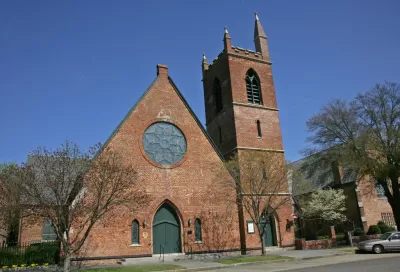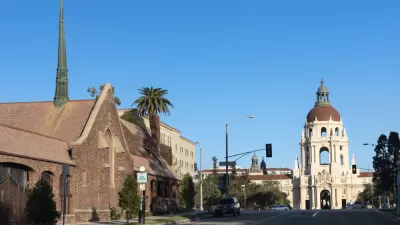The ‘Yes in God’s Backyard’ movement could get a boost from a proposed bill in the California state legislature.

The Los Angeles Times editorial board writes in support of a proposed bill that would make it easier and more affordable for religious institutions to build housing on land they own.
“Senate Bill 4 by Sen. Scott Wiener (D-San Francisco) would allow 100% affordable housing projects to be built by right — meaning the development proposal would be reviewed by city staff but the projects wouldn’t need planning commission or city council approval — if the developments are on land owned by religious institutions or nonprofit colleges and meet objective planning standards.”
According to the board, “California has nearly 39,000 acres of land used for religious purposes that could be developed,” with close to half of it in ‘high opportunity’ neighborhoods, where cost, zoning, and local opposition often make it difficult to build affordable housing. And many churches are eager to make use of this space and provide much-needed housing. “Allowing [churches] to build low-income housing would make better use of their property and generate income from the rentals. The bill also applies to nonprofit colleges, and it would make it easier for campuses to add affordable housing for employees and students.”
A 2020 version of the bill passed the California Senate but was blocked in the Assembly over disagreements about union labor requirements. The Building Trades Council continues to oppose the current bill, but “SB 4 includes compromise language that lawmakers backed last year in another housing streamlining bill that required union-level wages but not necessarily a union workforce.”
FULL STORY: Editorial: Religious institutions want to build affordable housing. Say ‘Yes in God’s Backyard’

Planetizen Federal Action Tracker
A weekly monitor of how Trump’s orders and actions are impacting planners and planning in America.

Maui's Vacation Rental Debate Turns Ugly
Verbal attacks, misinformation campaigns and fistfights plague a high-stakes debate to convert thousands of vacation rentals into long-term housing.

Restaurant Patios Were a Pandemic Win — Why Were They so Hard to Keep?
Social distancing requirements and changes in travel patterns prompted cities to pilot new uses for street and sidewalk space. Then it got complicated.

Charlottesville Temporarily Has No Zoning Code
A judge ordered the Virginia city to throw out its newly revised zoning code, leaving permitting for new development in legal limbo.

In California Battle of Housing vs. Environment, Housing Just Won
A new state law significantly limits the power of CEQA, an environmental review law that served as a powerful tool for blocking new development.

Boulder Eliminates Parking Minimums Citywide
Officials estimate the cost of building a single underground parking space at up to $100,000.
Urban Design for Planners 1: Software Tools
This six-course series explores essential urban design concepts using open source software and equips planners with the tools they need to participate fully in the urban design process.
Planning for Universal Design
Learn the tools for implementing Universal Design in planning regulations.
Heyer Gruel & Associates PA
JM Goldson LLC
Custer County Colorado
City of Camden Redevelopment Agency
City of Astoria
Transportation Research & Education Center (TREC) at Portland State University
Jefferson Parish Government
Camden Redevelopment Agency
City of Claremont




























